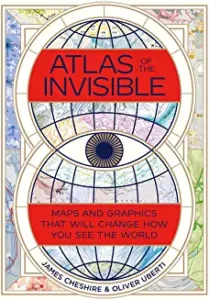Atlas of the Invisible: Maps and Graphics That will Change How You See The World by James Cheshire and Oliver Uberti 2021
While the authors had begun this book before COVID struck, the pandemic crystallized their thinking that “our ability to survive a crisis is only as good as our knowledge of the assailant”, and they combined that sense of crisis with the awareness that “numbers and text alone are not enough to reveal the invisible patterns that shape our lives”.
Armed with that philosophy, Cheshire, a geographer at University College, London and Uberti, a designer at National Geographic, explore some of the critical issues facing the world today and through the medium of maps and graphics, provide critical insights and new windows into familiar problems. With section headings of Who We Are, How We’re Doing, What we Face, and an Epilogue, the authors take on issues as varied as climate change and bike sharing programs, lead in the water of Flint, MI and criminal overfishing in Asia, happiness in different nations and the Doomsday Clock of the Union of Concerned Scientists.
Reading this book is akin to drinking from a fire hose with information and staggering conclusions coming in rapid fire and large amounts. I could cite example after example but will only provide these two. From a chapter entitled Carbon Overhead. “Choosing to fly is one of the most carbon intensive choices an individual can make. Per passenger, one trans-Atlantic return ticket carries the same atmospheric burden as two years on a meat-based diet, eight years without recycling, or four lifetimes of plastic bags. At the altitudes where most airliners fly, those plumes of water vapor and greenhouse gases trap heat, which doubles the warming effect of the plane’s carbon emissions.” Think about that on your next trip! And from a chapter entitled, Octopus’s Garden discussing internet undersea cables: The longest SEA-ME-WE 3 cable links 33 nations across Southeast Asia, the Middle East and Western Europe. At a scorching 200 terabits per second, the fastest cable could transfer all 280 million Beatles records ever purchased from the US to Spain in the time it took to read this sentence.
This is a fascinating and thought-provoking book to be dipped into over time rather than swallowed whole at one sitting. It will inform you, concern you, and perhaps even motivate you to political action. Read it!



